South Carolina Documents
Quitclaim Deed
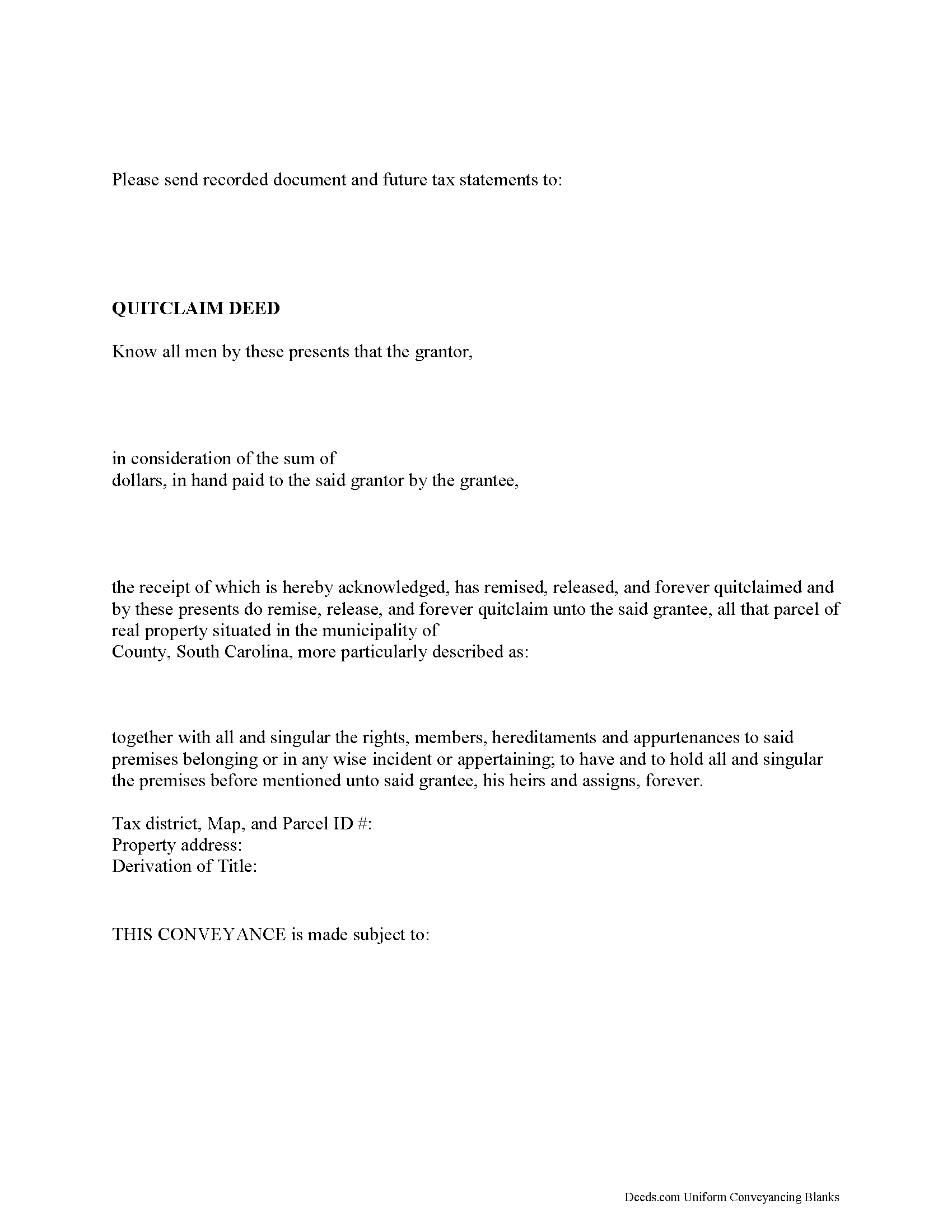
The grantor must sign the quitclaim deed in the presence of two credible witnesses. The quitclaim deed must also be subscribed by the two witnesses. The address of the grantee is needed in order to record this type of real estate document. The Registrar of Deeds does not require a derivation clause to be on a quitclaim deed in South Carolina. The Uniform Recognition of Acknowledgement Act must be complied with, the details of which are described in 30-5-30. For information on the content and format of a quitclaim deed, visit the county links listed under South Carolina.
A quitclaim deed of conveyance of lands is valid to subsequent creditors or purchasers for valuable consideration without notice, only after it is recorded in the office of the register of deeds in the county where the property is located. In the case of a subsequent purchaser of real estate (or a subsequent lien creditor on real estate) for valuable consideration without notice, the instrument evidencing the subsequent conveyance or lien must be filed for record in order for its holder to claim under section 30-7-10 of the South Carolina Code as a subsequent creditor or purchaser for value without notice, and t... More Information about the South Carolina Quitclaim Deed
Gift Deed
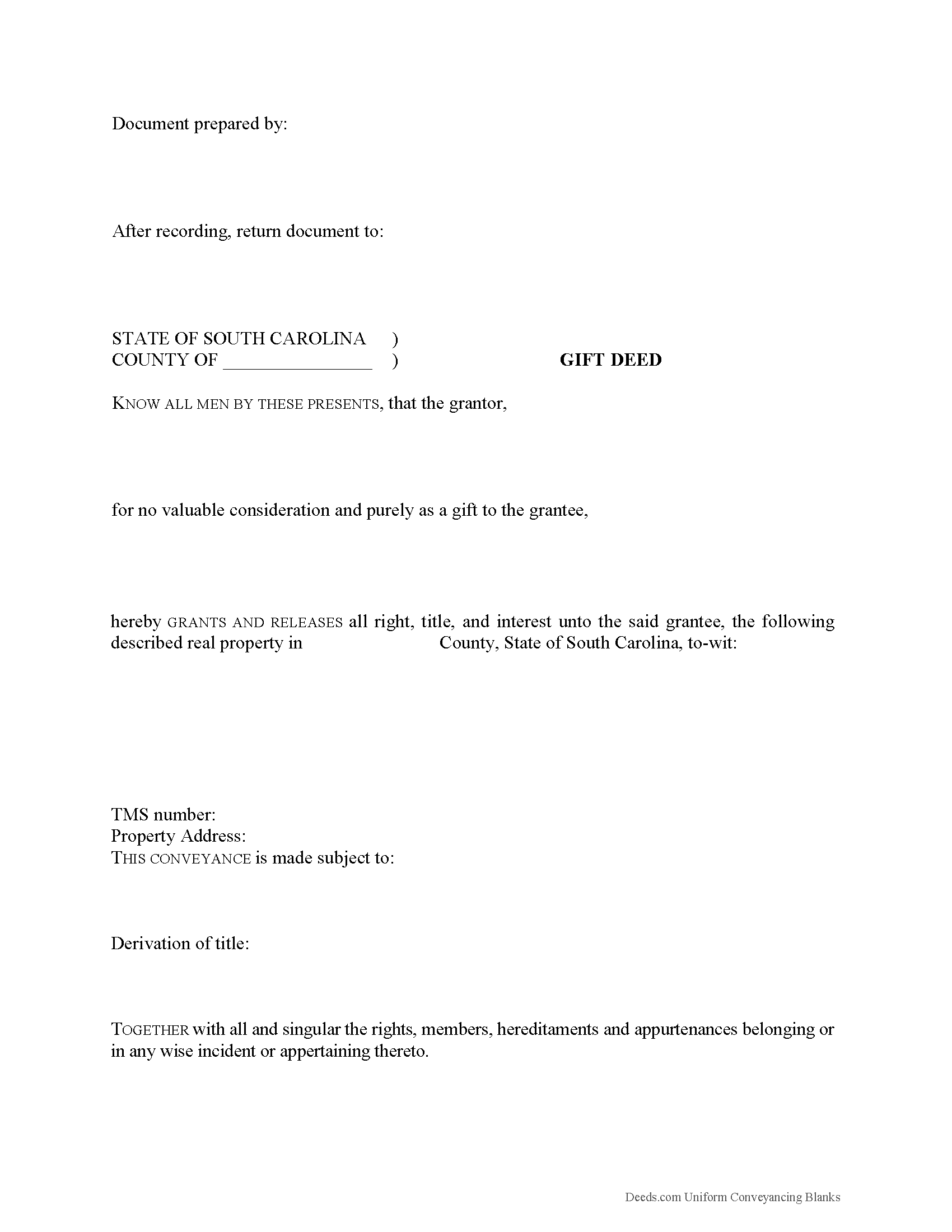
A gift deed, or deed of gift, is a legal document voluntarily transferring title to real property from one party (the grantor or donor) to another (the grantee or donee). A gift deed typically transfers real property between family or close friends. Gift deeds are also used to donate to a non-profit organization or charity. The deed serves as proof that the transfer is indeed a gift and without consideration (any conditions or form of compensation).
Valid deeds must meet the following requirements: The grantor must intend to make a present gift of the property, the grantor must deliver the property to the grantee, and the grantee must accept the gift. A gift deed must contain language that explicitly states no consideration is expected or required, because any ambiguity or reference to consideration can make the deed contestable in court. A promise to transfer ownership in the future is not a gift, and any deed that does not immediately transfer the interest in the property, or meet any of the aforementioned requirements, can be revoked [1].
A lawful gift deed includes the grantor's full name and marital status, as well as the grantee's full name, marital status, mailing add... More Information about the South Carolina Gift Deed
Warranty Deed
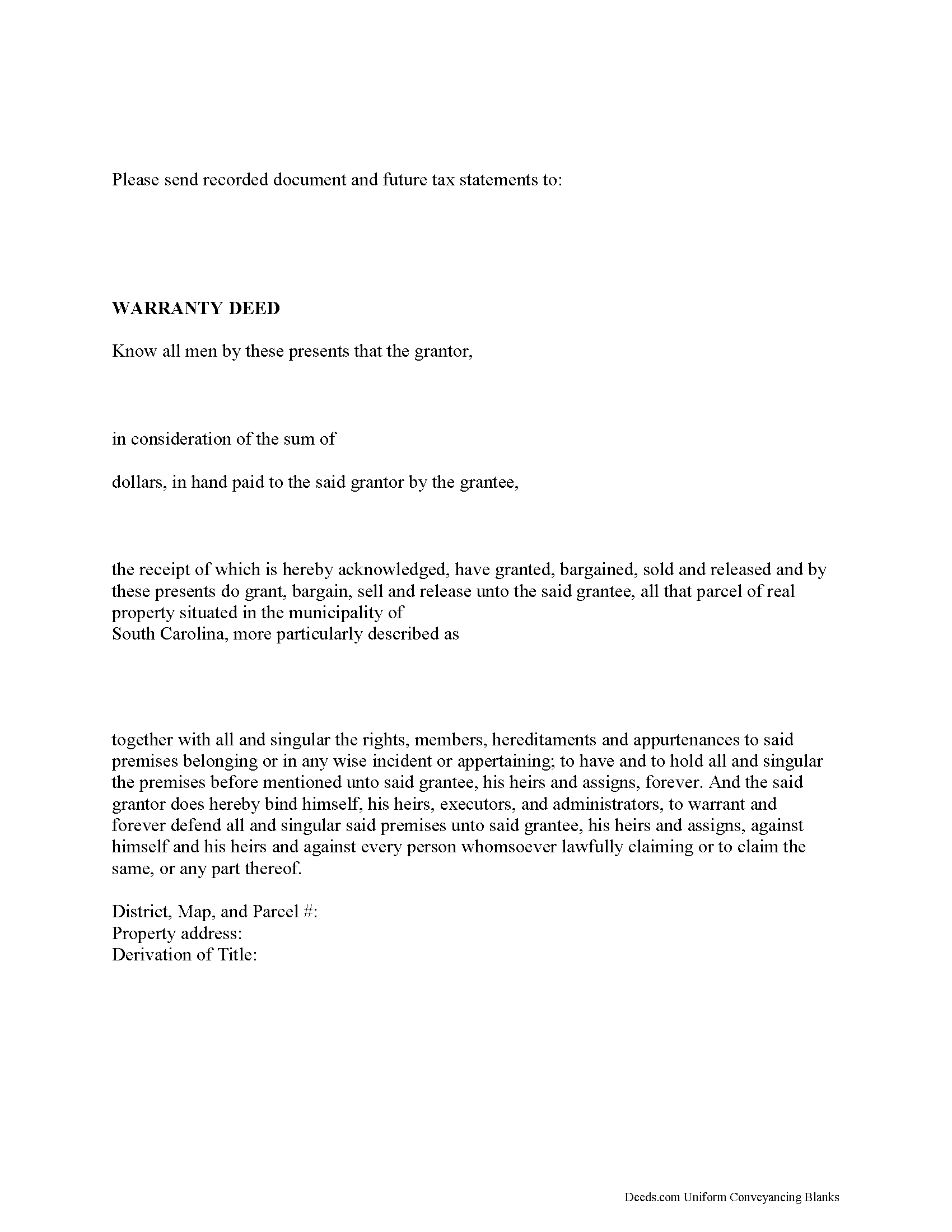
A general warranty deed in South Carolina is customarily used in residential real estate transactions to transfer title to real property. A statutory form for a conveyance of real property in fee simple is presented in section 27-7-10 of the South Carolina Code and can be used for a warranty deed. Every real estate deed in this state will pass the entire interest of the grantor in the property described in the deed, unless a contrary intention is provided in the deed (27-5-130). The statutory form includes a guarantee from the grantor that he or she will warrant and forever defend all and singular said premises unto the grantee and as against the grantor, his heirs, executors, and administrators, and against every person lawfully claiming or to claim the same (27-7-10). The statutory form does not oblige any person to insert the clause of warranty and does not restrain a person from inserting any other clause (27-7-20).
The execution of a warranty deed must be acknowledged or proved in accordance with South Carolina law in order for the document to be recorded with the register of deeds. Warranty deeds in South Carolina require two witnesses. A notary public may function as one... More Information about the South Carolina Warranty Deed
Special Warranty Deed
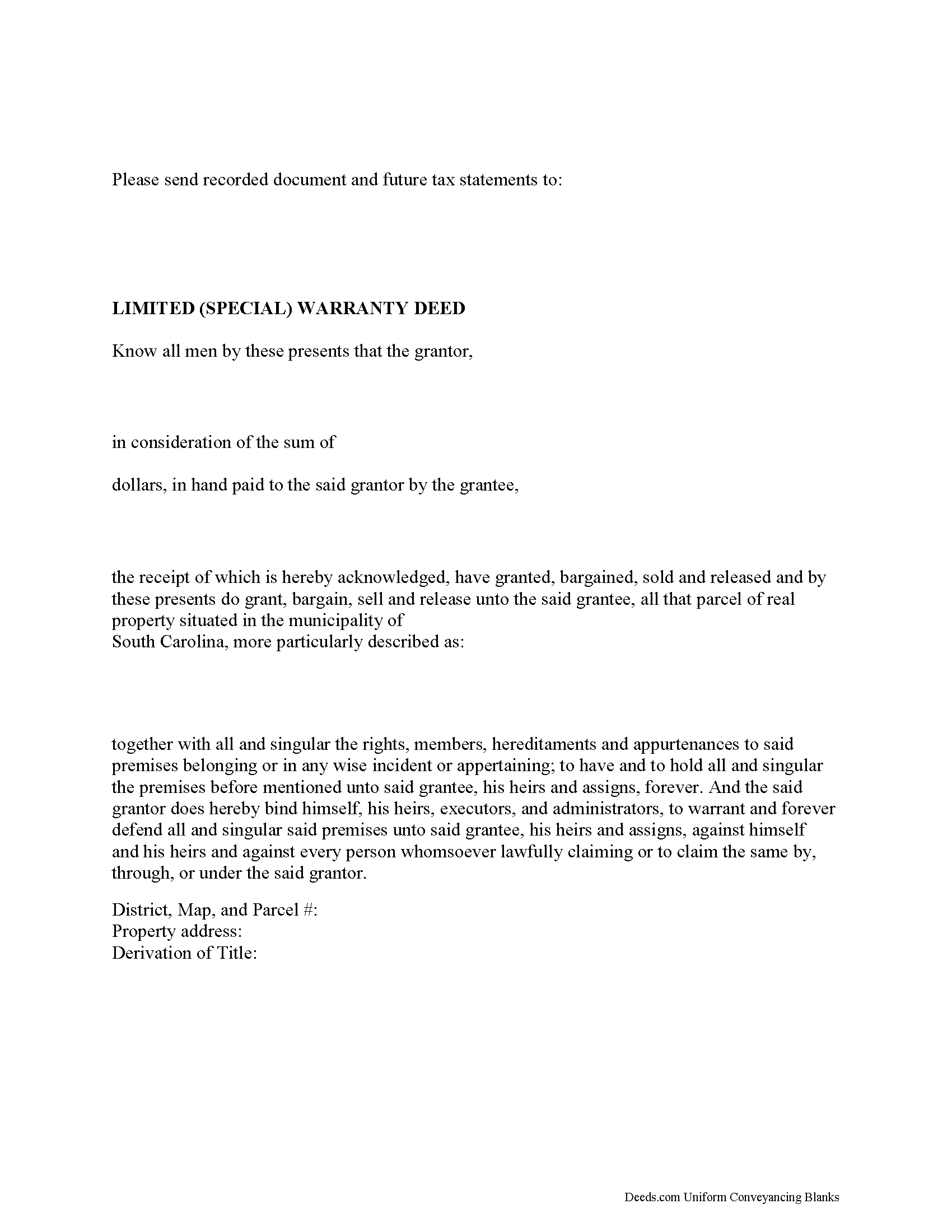
A limited warranty deed can be used to transfer title to real estate in South Carolina. A limited warranty deed may also be called a special warranty deed. This type of deed is commonly used in commercial real estate transactions in this state. A conveyance of real estate in South Carolina will pass the entire interest of the grantor in the property described to the grantee, unless a different intention is clearly expressed in the deed (27-5-130). A statutory form for a conveyance of real property in fee simple is presented in 27-7-10 of the South Carolina General Code. This form can be used for a limited warranty deed, as section 27-7-20 of the South Carolina General Code provides that the statutory form does not force anyone to insert the clause of warranty and also does not prevent a person from inserting any other clause. In a limited warranty deed, the grantor will warrant and defend the title to the property to the grantee, the grantee's heirs, successors, and assigns against the said grantor and his successors and assigns.
A limited warranty deed must be signed and acknowledged or proved in accordance with South Carolina law in order for the deed to be recorded with the ... More Information about the South Carolina Special Warranty Deed
Grant Deed
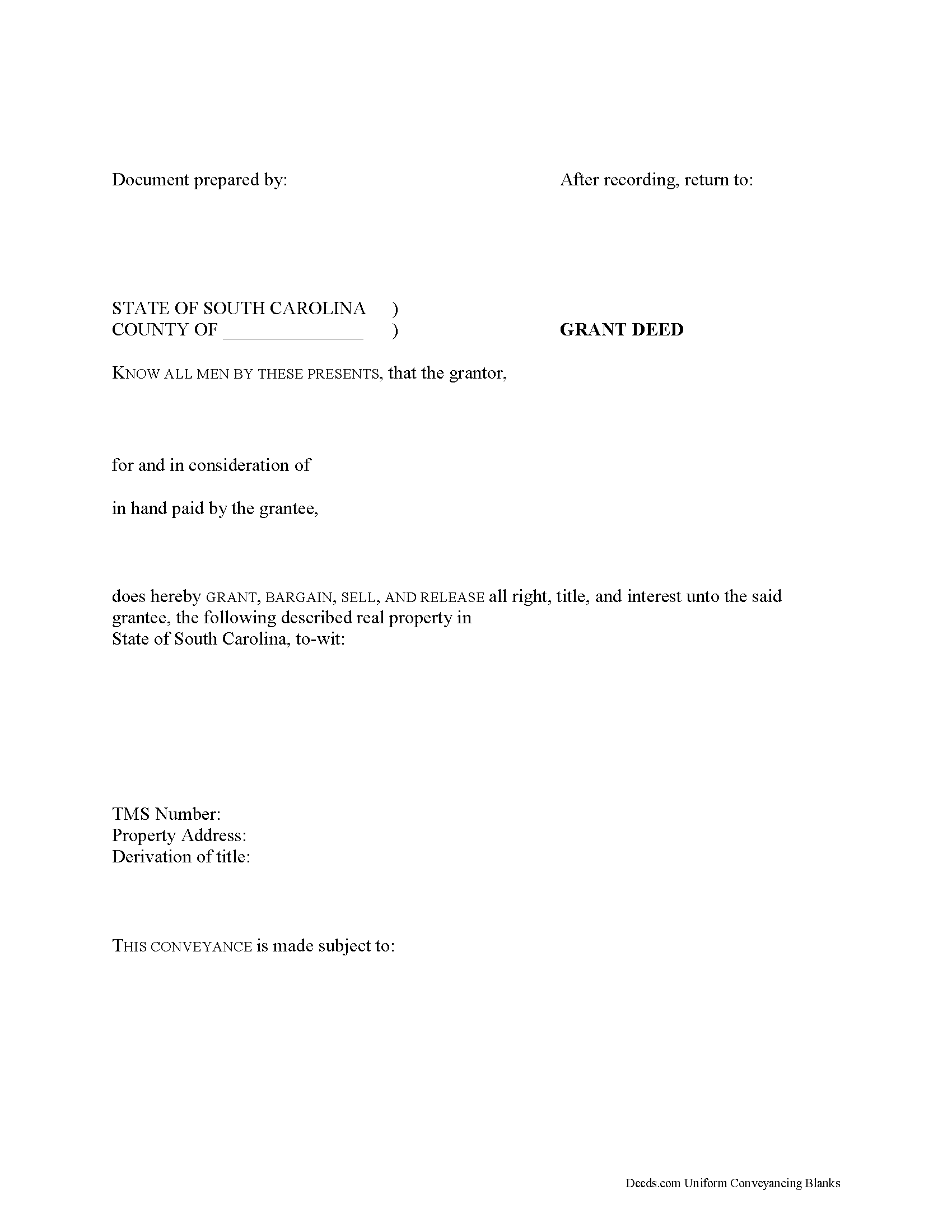
In South Carolina, title to real property can be transferred from one party to another by executing a grant deed. Use a grant deed to transfer a fee simple interest with some covenants of title. The words "grant, bargain, sell, and release" in the conveyancing clause signify a transfer of title in fee simple (S.C. Code 27-7-10).
Grant deeds offer the grantee (buyer) more protection than quitclaim deeds, but less than warranty deeds. A grant deed differs from a quitclaim deed in that the latter offers no warranty of title, and only conveys any interest that the grantor may have in the subject estate. Grant deeds guarantee through implied covenants that the title is free of any encumbrances (except for those stated in the deed) and that the grantor holds an interest in the property and is free to convey it. A warranty deed offers more surety than a grant deed because it requires the grantor to defend against claims to the title.
A lawful grant deed includes the grantor's full name, mailing address, and marital status; the consideration given for the transfer; and the grantee's full name, mailing address, marital status, and vesting. Vesting describes how the grantee holds title... More Information about the South Carolina Grant Deed
Correction Deed
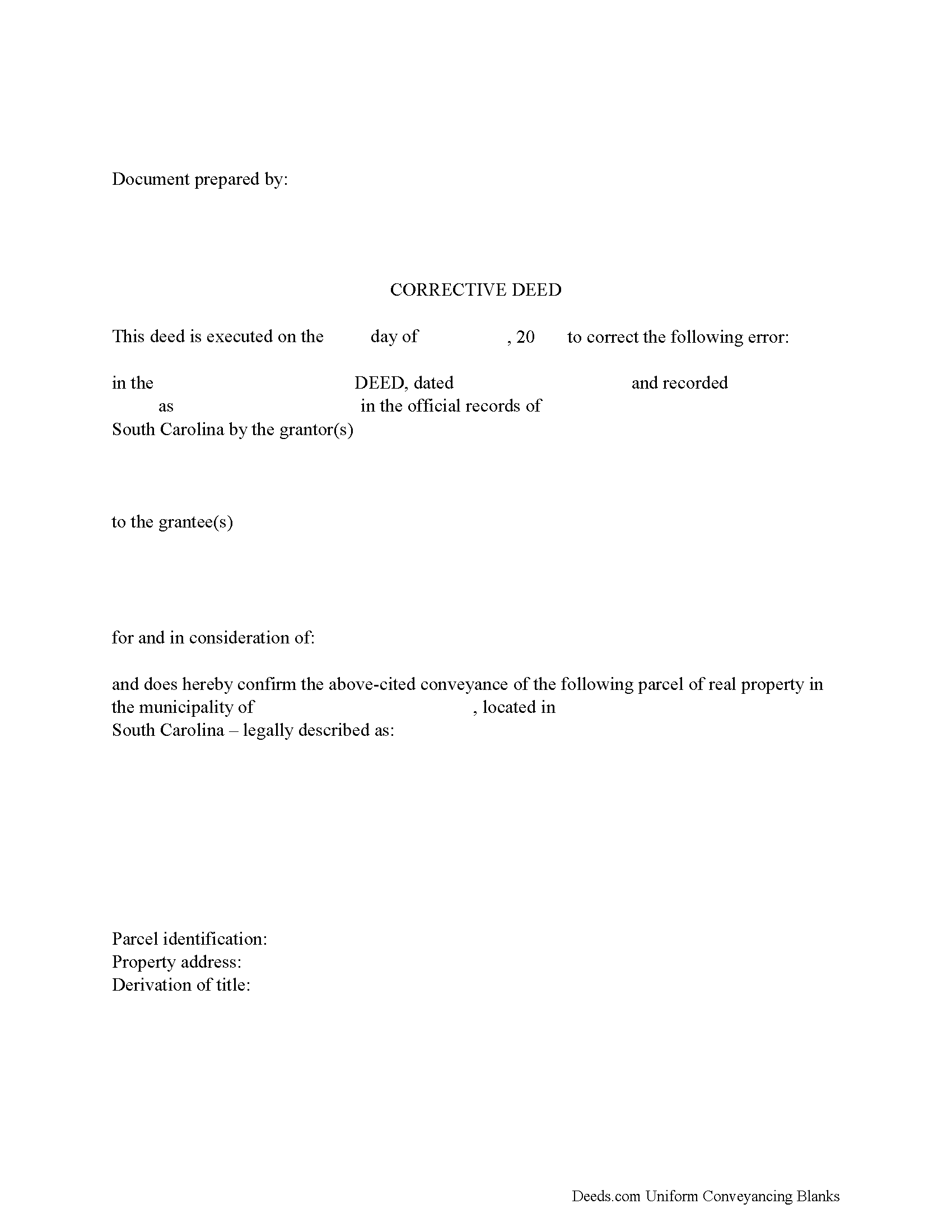
In South Carolina, use a correction deed to amend a previously recorded deed that contains a minor error.
A corrective deed is in effect an explanation and correction of an error in a prior instrument. As such, it passes no title, but only reiterates and confirms the prior conveyance. It should be executed from the original grantor to the original grantee, and it needs to be recorded in order to be legally valid.
The correction deed must reference the original conveyance it is correcting by type of error, date of execution and recording, as well as by recording number and location. Beyond that, it restates the information given in the prior deed, thus serving as its de facto reiteration. The prior deed, however, which constitutes the actual conveyance of title, remains on record.
Deeds of correction are most appropriate for minor errors and omissions in the original deed, such as misspelled names, omission of marital status, or typos in the legal description. More substantial changes, such as adding a name to the title, changing vesting information or legal description of the property, require a new deed of conveyance instead of a correction deed.
Correction deeds ar... More Information about the South Carolina Correction Deed
Easement Deed
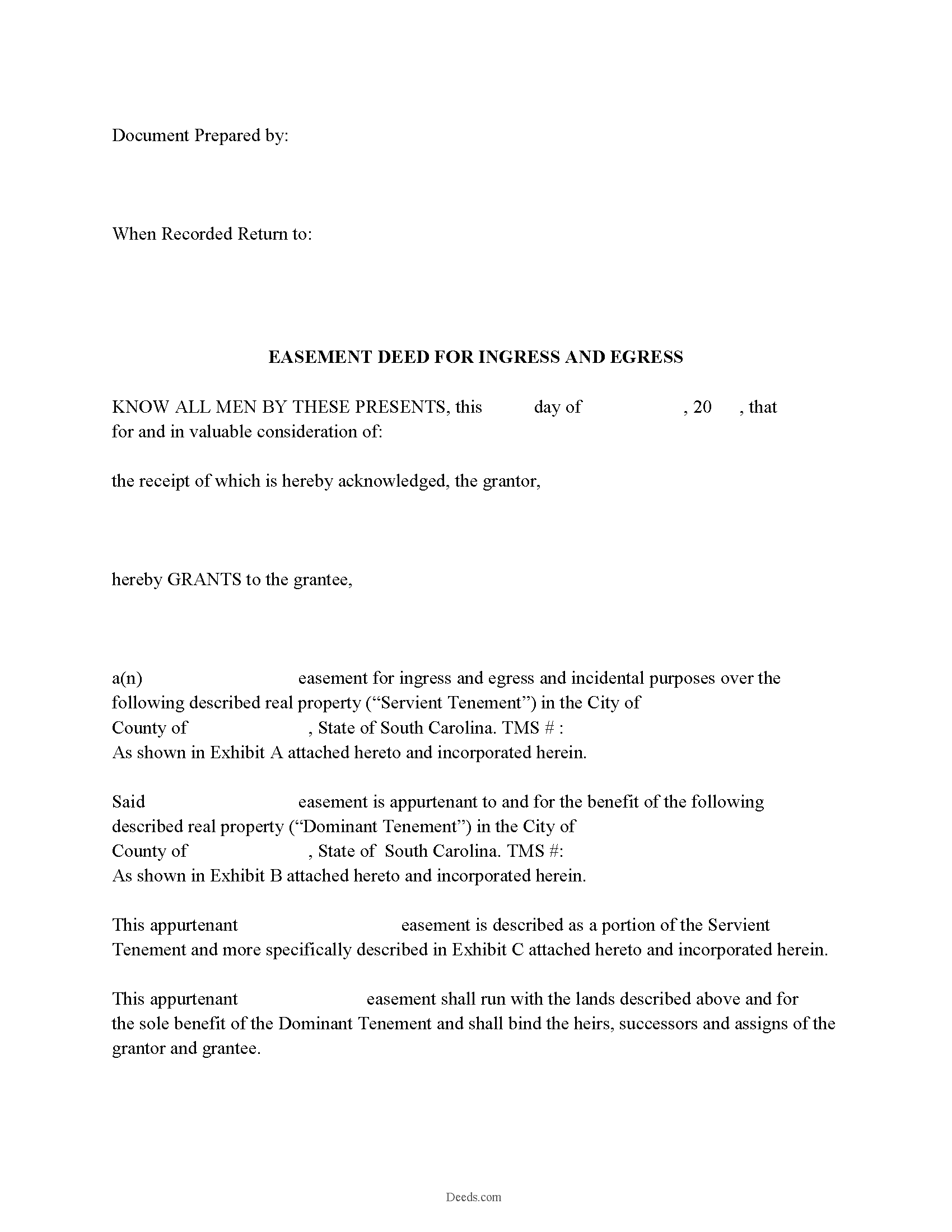
An easement is a non-possessory right of use over another's land that allows the holder to use another's property for a specific purpose. Easements may be express or implied. An express easement can be created by deed, contract, or other written instrument. An express easement must describe the scope of the interest being conveyed, along with the location and dimensions of the easement. An implied easement can be created by pre-existing use, when it is evident that the parties involved intended to create an easement.
Before a deed or other instrument of writing can be recorded in South Carolina, it must be acknowledged or proved by either of the following methods: (A) the execution of the deed must be proved by the affidavit of a subscribing witness to the instrument, taken before an officer in the state competent to administer oaths or (B) a deed or other instrument must be signed by the grantor in the presence of two witnesses, taken before an officer in the state competent to administer oaths (30-5-30A, B). A notary public may be one of the witnesses to an easement deed. Acknowledgments taken out of state must comply with the Uniform Recognition of Acknowledgments Act (30-5-... More Information about the South Carolina Easement Deed
Termination of Easement
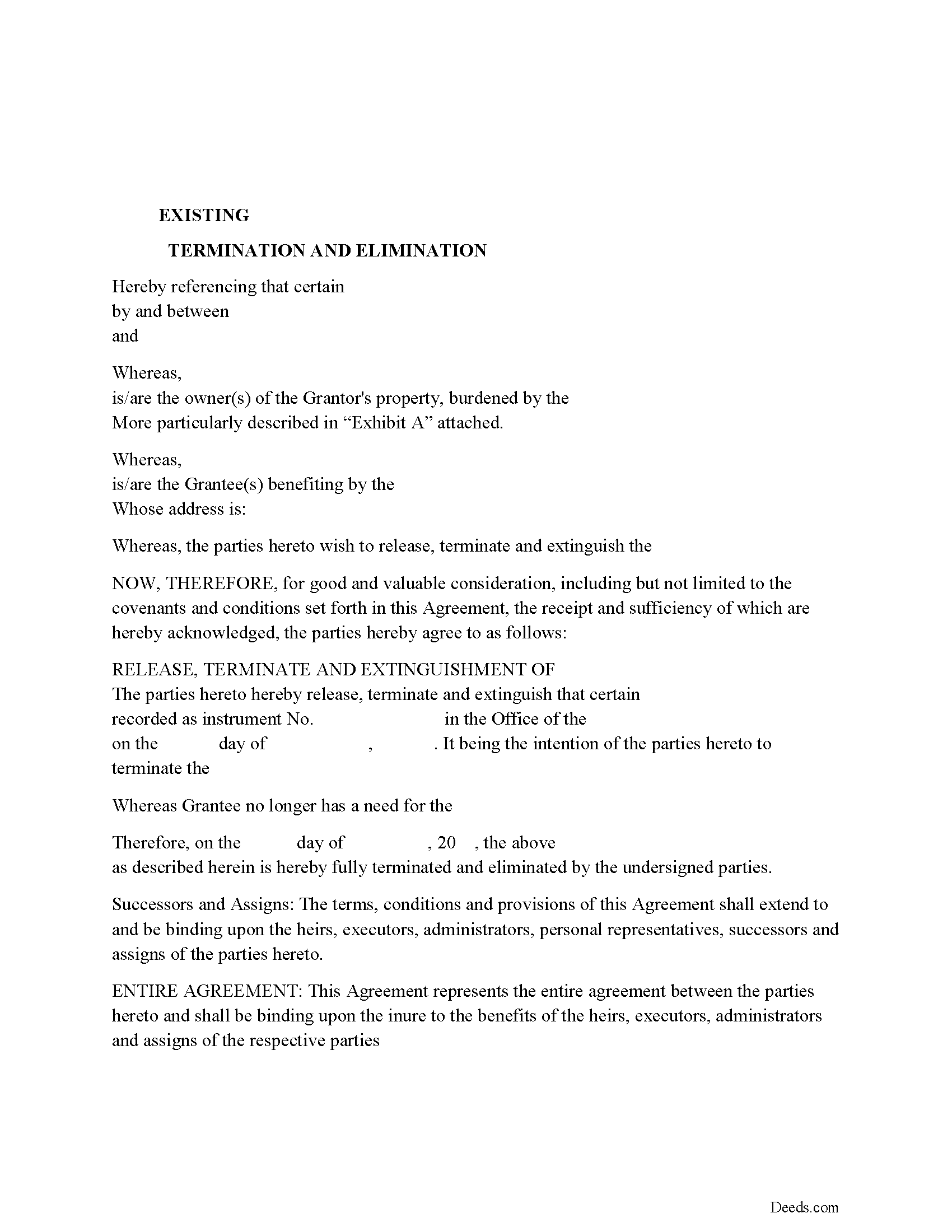
Use this form to release, terminate, extinguish a previously recorded document that involves access to and from a property.
Documents such as:
1. Easement Deeds or Agreements (An easement is a non-possessory interest in land, granting the right to use someone else's property for a specific purpose, like a driveway or utility line)
2. Access Roads
3. Right of Ways
4. Utility Easements (Power, Gas, Water, Sewer, Etc.)
5. Drainage Easements
This document allows the owner of the land, burdened by the access and the party that benefits from the access, to sign an agreement releasing the property from such access, ... More Information about the South Carolina Termination of Easement
Mortgage Secured by Promissory Note
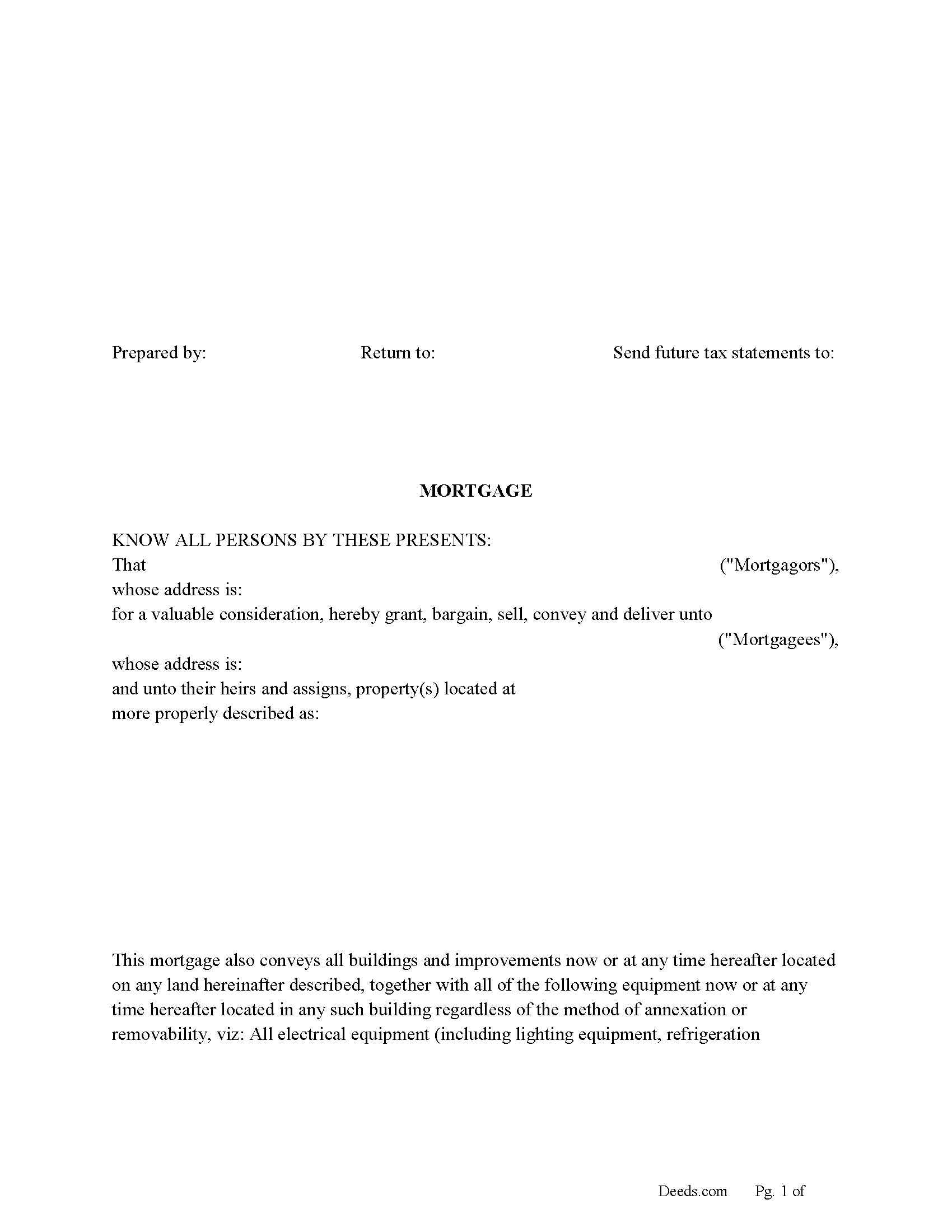
Use this form to mortgage residential property, rental property (up to 4 units), small commercial, condominiums and planned unit developments. A mortgagor is often referred to as the borrower and the mortgagee as the lender. (The mortgagor shall be deemed the owner of the land and the mortgagee as owner of the money lent or due and the mortgagee shall be entitled to recover satisfaction for such money out of the land by foreclosure and sale according to law. But notwithstanding the foregoing provision all releases of the equity of redemption shall be binding and effectual in law.) (SECTION 29-3-10. Rights and title of mortgagor and mortgagee.) This form meets recording requirements for a South Carolina Mortgage:
- Signature of mortgagor (borrower)
- Name and address of mortgagee (lender)
- Two witnesses
- SC Probate or Acknowledgement
- Property description
- Derivation Clause
A mortgage and promissory note with stringent default terms can be advantageous to the lender in the case of a default. Compatible with investor/owner financing.
(South Carolina Mortgage Package includes forms, guidelines, and completed examples) For use in South Carolina only.
... More Information about the South Carolina Mortgage Secured by Promissory Note
Satisfaction of Mortgage or Deed of Trust
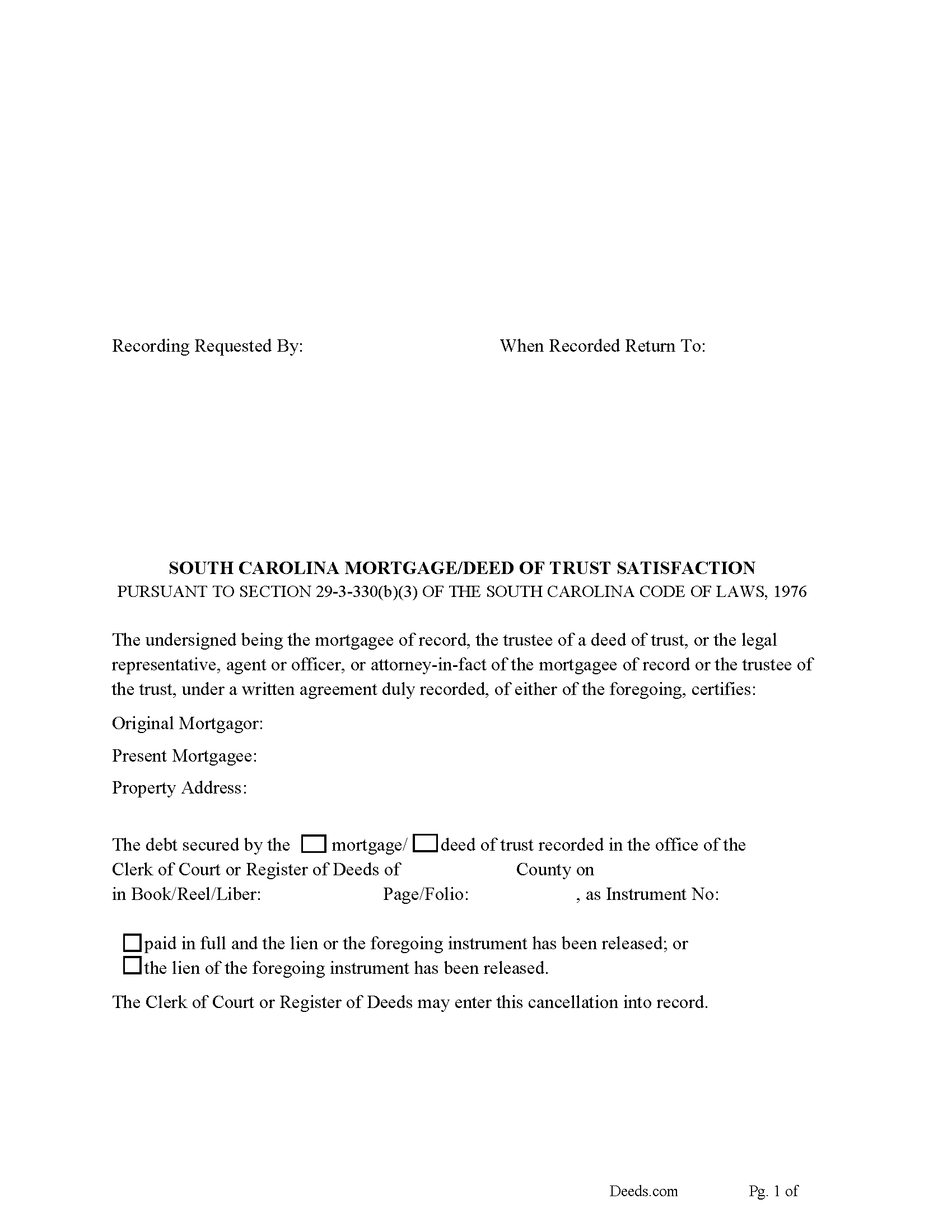
Use this form to release a mortgage or deed of trust document. (The mortgagee of record, the trustee of a deed of trust, or an agent or officer, legal representative, or attorney-in-fact, under a written instrument duly recorded, of either of the foregoing, may execute a satisfaction or release of a mortgage or deed of trust.) Section 29-3-330(b)(3)
The mortgagee is often referred to as the lender.
(South Carolina SOM Package includes form, guidelines, and completed example) For use in South Carolina only.
... More Information about the South Carolina Satisfaction of Mortgage or Deed of Trust
Special Power of Attorney for Real Property
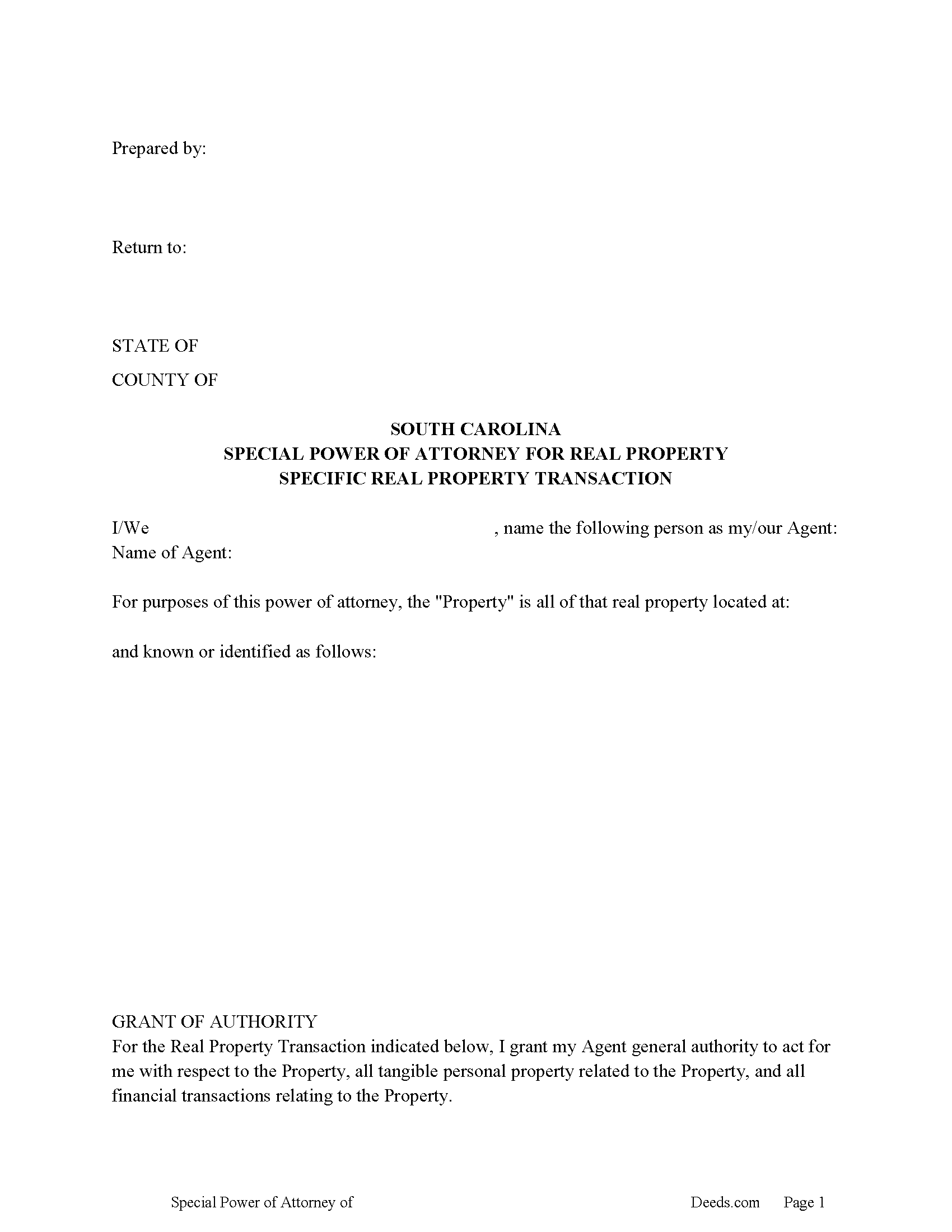
In this power of attorney, the principal nominates an agent to perform one of these four (4) actions relating to a specific real property.
________ to finance the purchase of real property
________ to refinance a Property
________ purchase of the Property when principal(s) are buyers
________ sale of the Property when principal(s) are sellers
Then your agent is authorized to perform the chosen task to his/her fullest extent under these statutes.
(1) The authority to act with respect to real property as set forth in Section 62-8-204 of the South Carolina General Statutes;
(2) The authority to act with respect to tangible personal property as set forth in Section
62-8-205 of the South Carolina General Statutes; and
(3) The authority to act with respect to banks and other financial institutions as set forth in Section 62-8-208 of the South Carolina General Statutes
Included is a "Special Instructions" section, where you can further limit or define your Agent's powers.
The meaning and effect of this power of attorney shall for all purposes be determined by the law of the State of South Carolina.
(South Carolina SPOA Package includes form, gu... More Information about the South Carolina Special Power of Attorney for Real Property
Affidavit of Deceased Joint Tenant
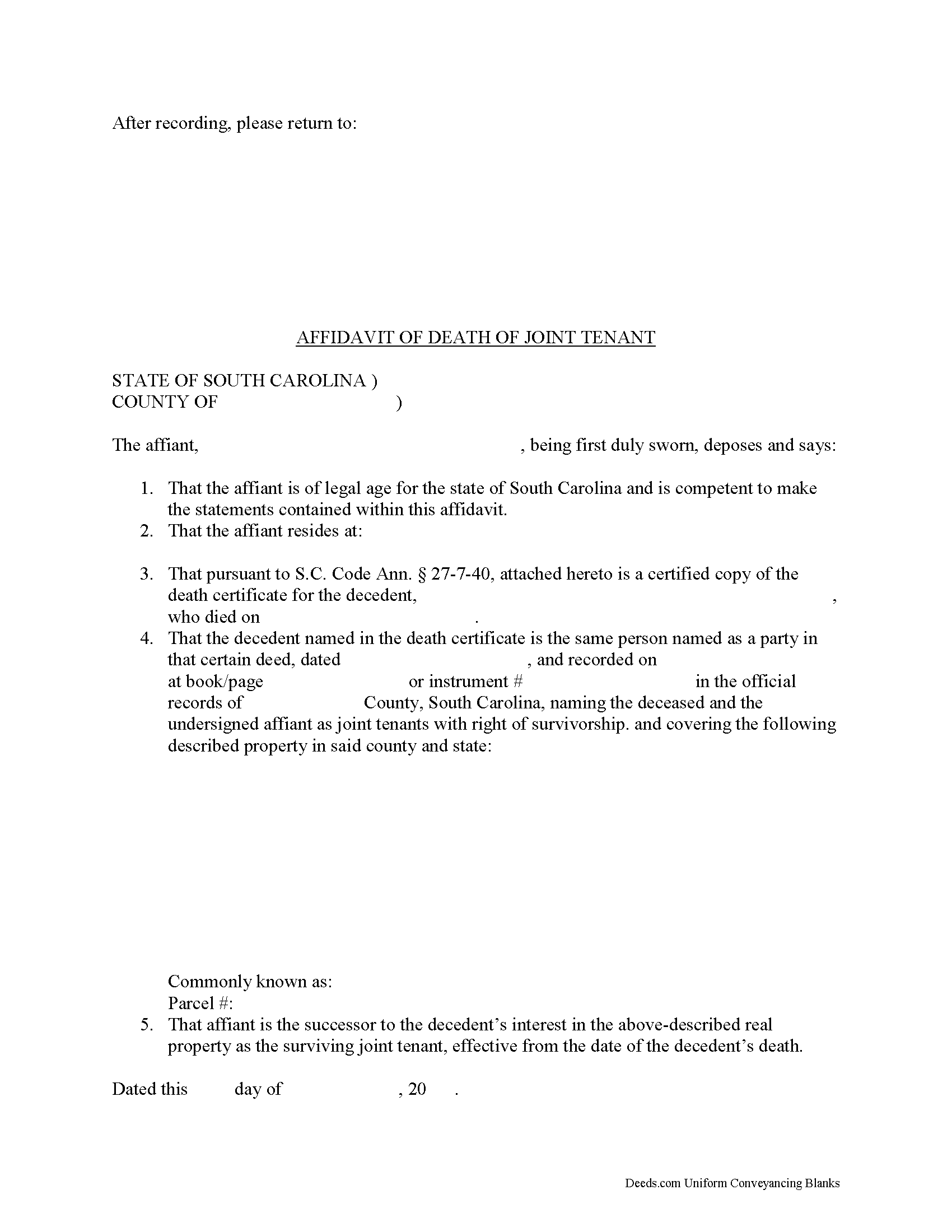
Joint tenancy in South Carolina is governed by S.C. Code Ann. 27-7-40.
When two or more people share ownership of real property, they have choice of ways in which to hold title -- either as tenants in common or as joint tenants with the right of survivorship.
Tenancy in common is the standard form of co-ownership. In it, each person owns a percentage of the land, and when the owner dies, that portion passes to his/her estate where it is distributed during the probate process.
Joint tenancy, on the other hand, must be declared in the text of the deed: "whenever any deed of conveyance of real estate contains the names of the grantees followed by the words 'as joint tenants with rights of survivorship, and not as tenants in common' the creation of a joint tenancy with rights of survivorship in the real estate is conclusively deemed to have been created" ( 27-7-40(a)).
The statutes go on to explain that in the "event of the death of a joint tenant, and in the event only one other joint tenant in the joint tenancy survives, the entire interest of the deceased joint tenant in the real estate vests in the surviving joint tenant, who is vested with the entire interest in th... More Information about the South Carolina Affidavit of Deceased Joint Tenant
Personal Representative Deed of Sale
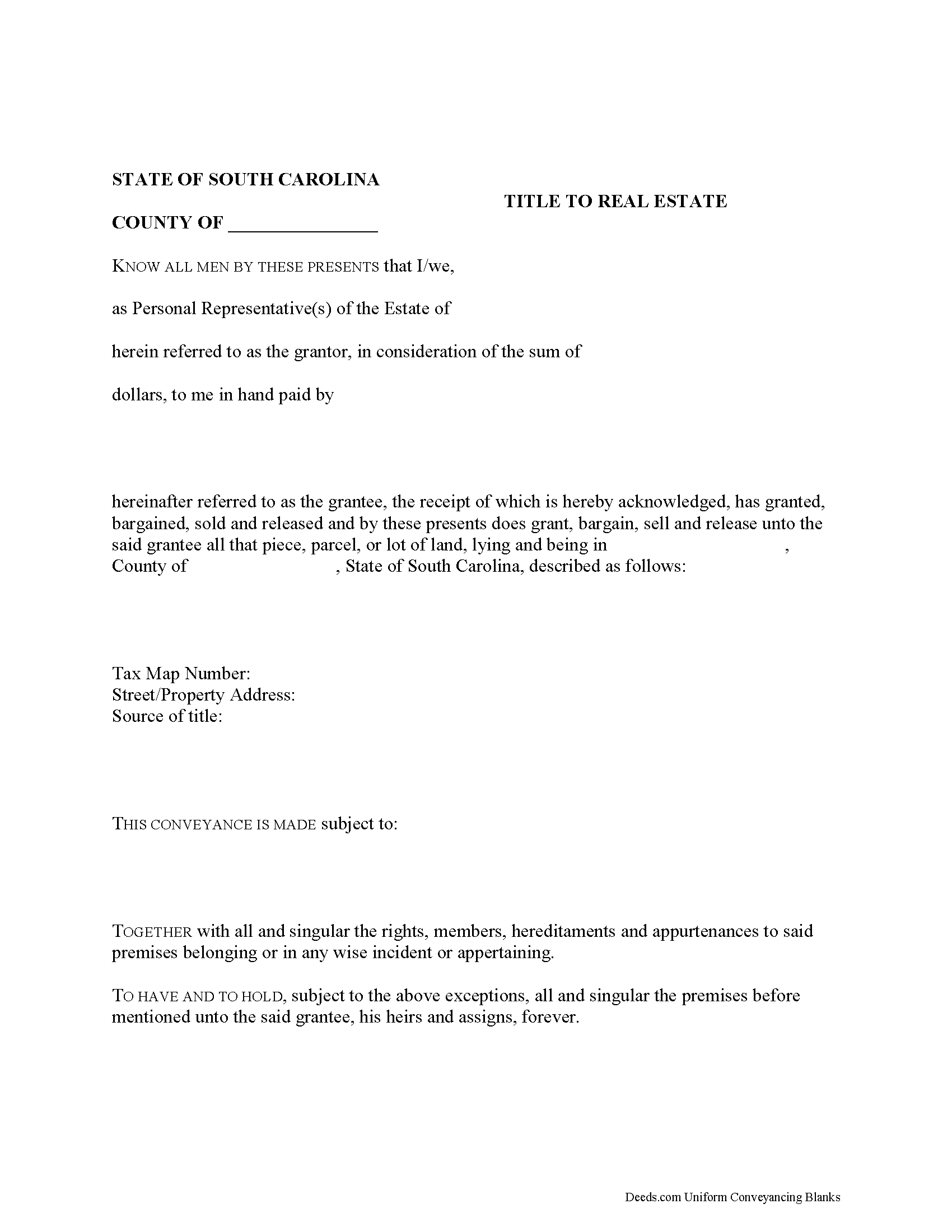
In South Carolina, title to a decedent's real property devolves at death to the decedent's heirs (intestate estates) and devisees (testate estates) (S.C. Code 62-3-101). Though title passes by operation of law, the estate is still subject to administration in probate. Probate is the legal process of settling the decedent's estate and distributing assets to those entitled to receive it.
Unless empowered in the decedent's will, a personal representative (PR) may not sell property from the estate without the court's authorization (62-3-711(b)). The procedures for selling real property in probate are outlined at 62-3-1301 et seq., and are "the only procedure for the sale of lands by the court, except where the will of the decedent authorizes to the contrary" (62-3-1301). A PR may be required to sell real property to pay claims on the estate or for other expenses in the course of administration.
The process for a sale of realty involves filing inventory and appraisement with the court, submitting a petition for the sale of property, filing a lis pendens (a notice that the property is the subject of litigation) and serving summonses, hearing the petition, and the court issuing an o... More Information about the South Carolina Personal Representative Deed of Sale
Personal Representative Deed of Distribution
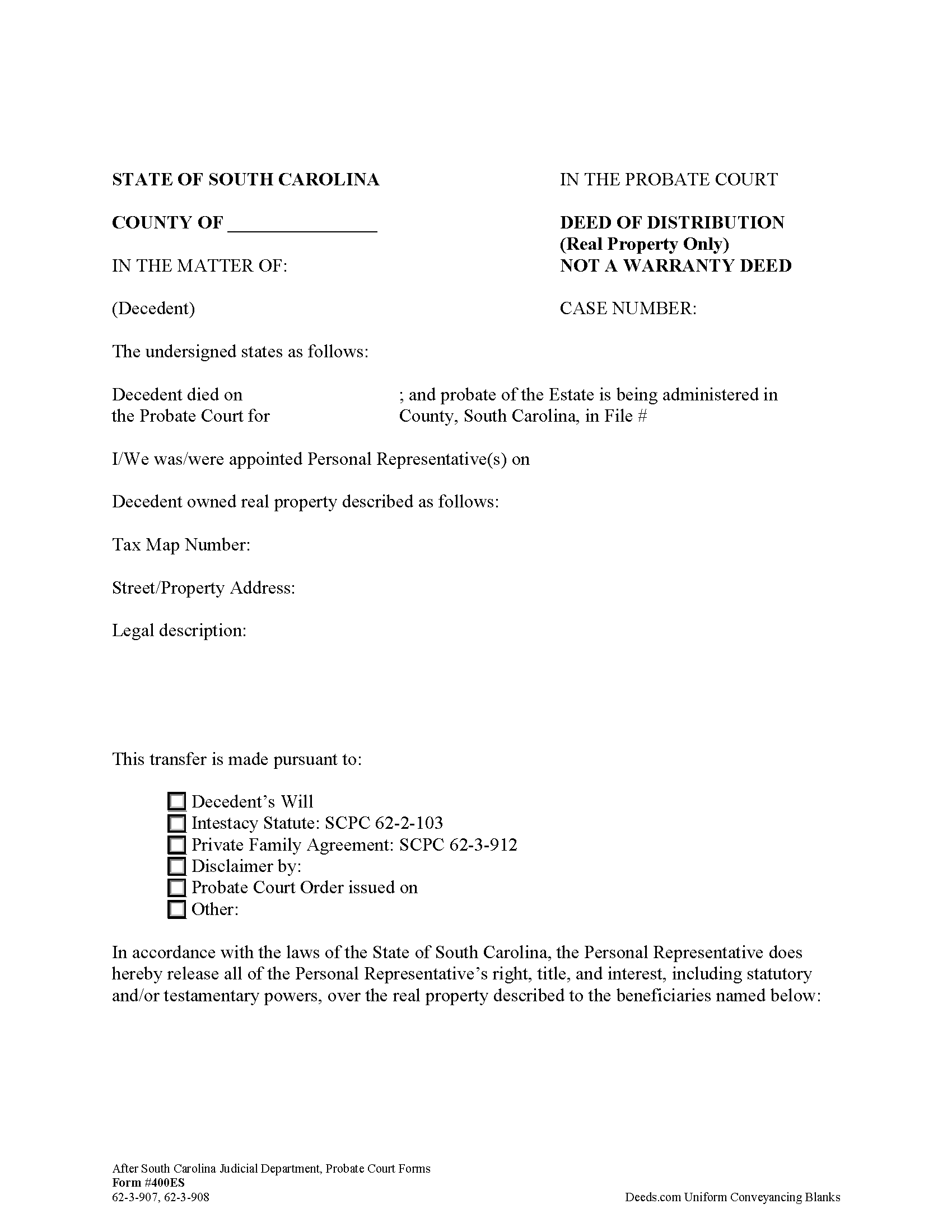
In South Carolina, title to a decedent's real property devolves at death to the decedent's heirs (intestate estates) and devisees (testate estates) (S.C. Code 62-3-101). Though title passes by operation of law, the estate is still subject to administration in probate. Probate is the legal process of settling the decedent's estate and distributing assets to those entitled to receive it. A PR may not make distribution of the estate without first obtaining permission from the court.
The personal representative (PR) of the estate executes a deed of distribution following an order for distribution from the court to distribute real property from a decedent's estate. The deed of distribution (Form 400ES) evidences the legal succession of title of the decedent's interest in real property and releases the PR's powers over the subject property.
The deed, given under 62-3-907, 62-3-908 is "conclusive evidence that the distributee has succeeded to the interest of the estate...against all persons interested in the estate" (62-3-908).
Apart from meeting all state and local standards for documents affecting title to real property, the deed of distribution must identify the reason for th... More Information about the South Carolina Personal Representative Deed of Distribution
Mineral Deed
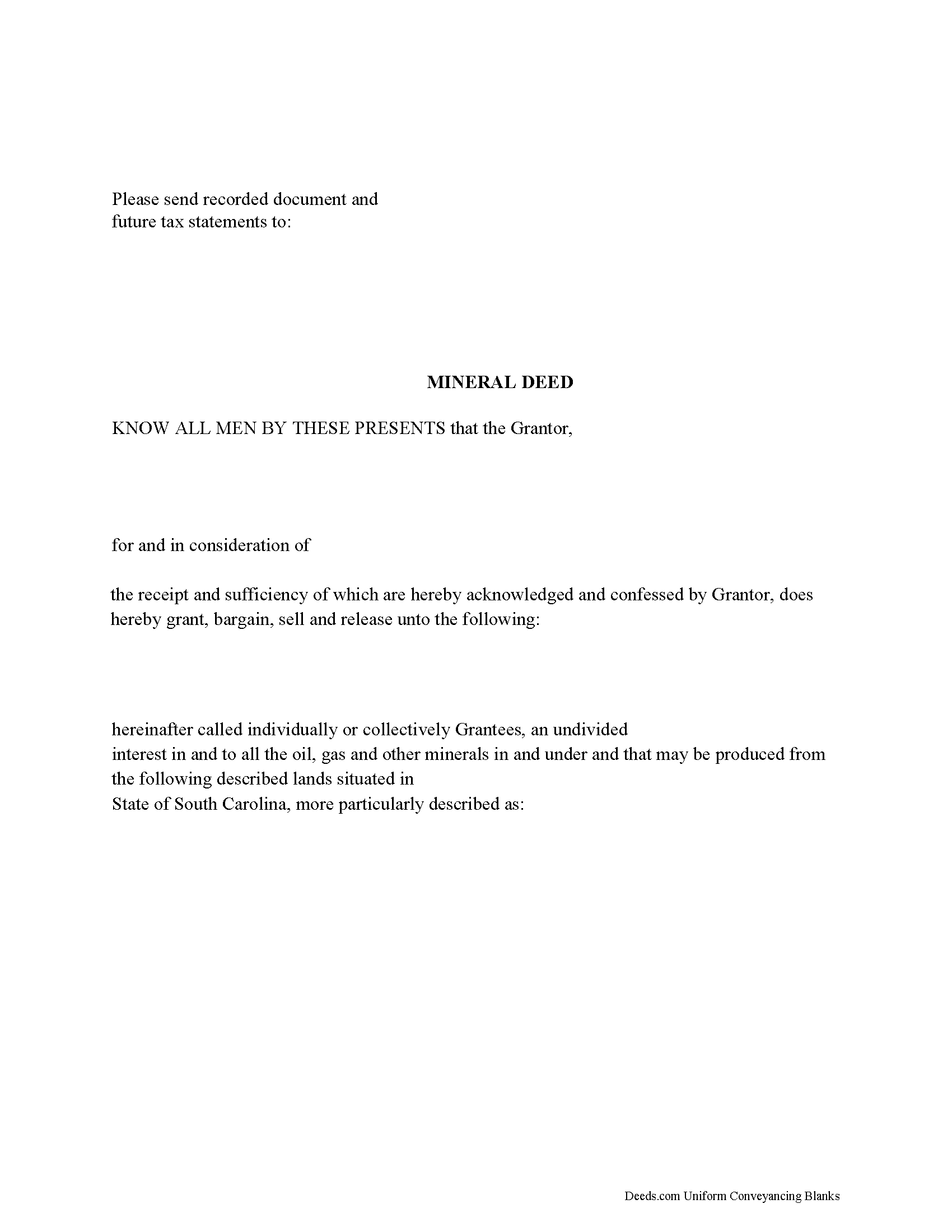
The General Mineral Deed in South Carolina transfers oil, gas, and mineral rights from the grantor to the grantee. THIS IS NOT A LEASE. There are no Exceptions or Reservations included.
The transfer includes the oil, gas and other minerals of every kind and nature. It also transfers any and all rights to receive royalties, overriding royalties, net profits interests or other payments out of or with respect to those oil, gas and other minerals. The Grantor can stipulate the percentage of Mineral Rights the Grantee will receive and is made subject to any rights existing under any valid and subsisting oil and gas lease or leases of record.
This general mineral deed gives the grantee the right to access, for the purpose of mining, drilling, exploring, operating and developing said lands for oil, gas, and other minerals, and storing handling, transporting and marketing of such.
In this document the Grantor Warrants and will defend said Title to Grantee. Use of this document has a permanent effect on your rights to the property, if you are not completely sure of what you are executing seek the advice of a legal professional.
(South Carolina MD Package includes form, guideline... More Information about the South Carolina Mineral Deed
Mineral Deed with Quitclaim Covenants
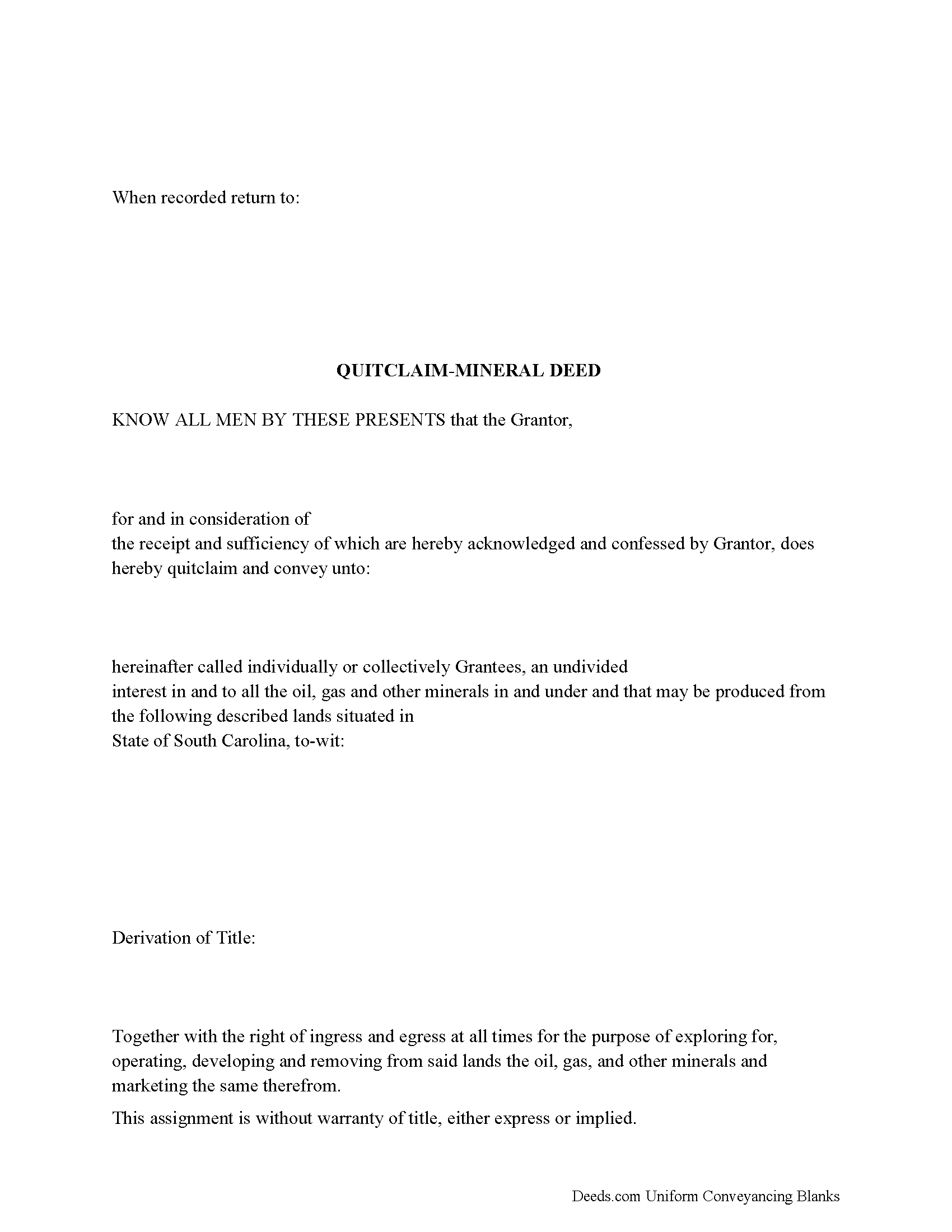
The General Mineral Deed in South Carolina Quitclaims oil, gas, and mineral rights from the grantor to the grantee. THIS IS NOT A LEASE. There are no Exceptions or Reservations included.
The transfer includes the oil, gas and other minerals of every kind and nature. The Grantor can stipulate the percentage of Mineral Rights the Grantee will receive.
This general mineral deed gives the grantee the right to access, for the purpose of mining, drilling, exploring, operating and developing said lands for oil, gas, and other minerals, and storing handling, transporting and marketing of such.
The seller, or grantor Quitclaims the mineral rights and does NOT accept responsibility to any discrepancy of title (This assignment is without warranty of title, either express or implied)
Uses: Mineral deeds with quitclaim are often used in situations where the grantor wants to quickly release any interest they might have in mineral rights, such as in settling estates, resolving disputes, clearing up uncertainties about ownership in a title's history or when mineral rights have previously been severed or fragmented from surface rights and cloud a title, making it difficult to transfer p... More Information about the South Carolina Mineral Deed with Quitclaim Covenants
Trustee Deed
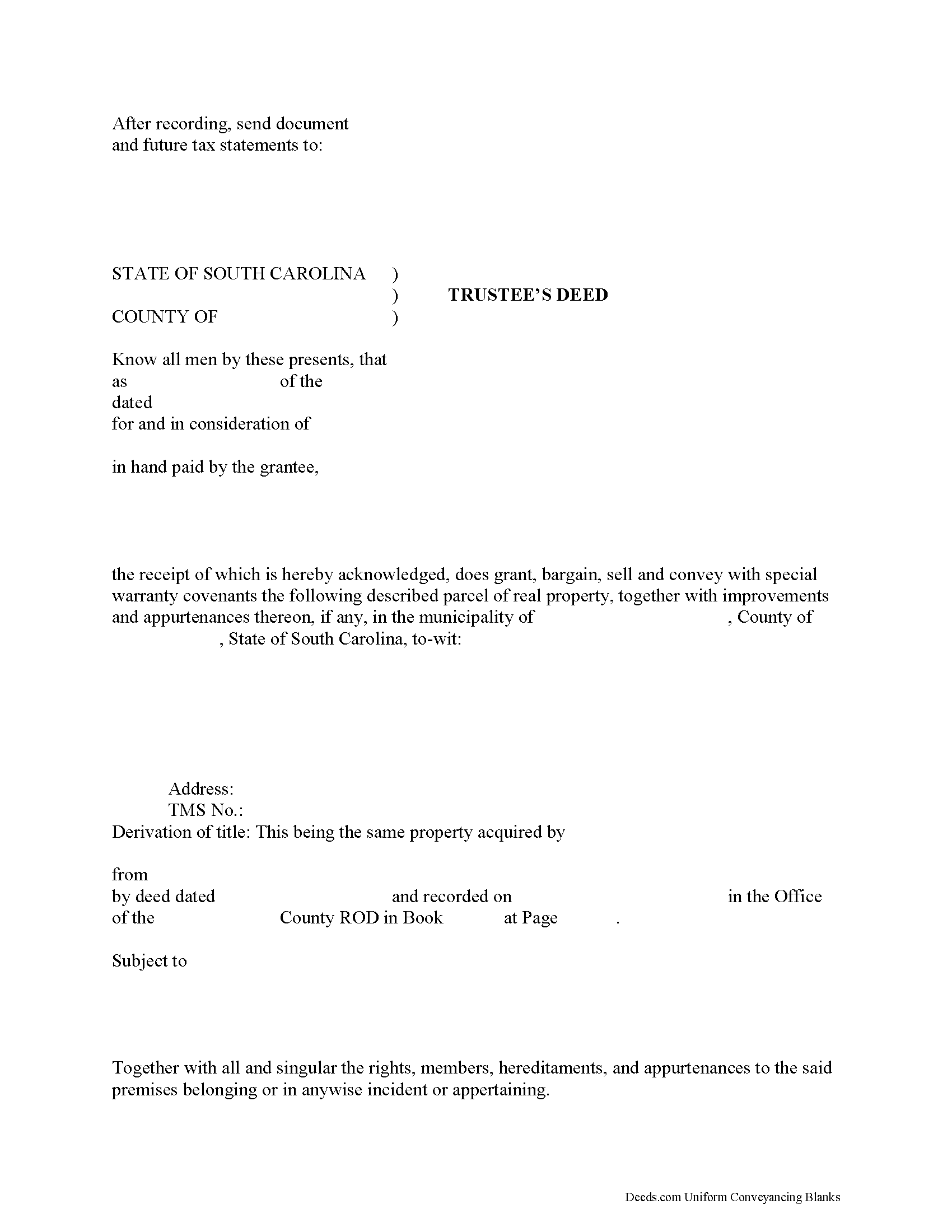
A trustee's deed transfers interest in real property held in a living trust.
A living (inter vivos) trust is an estate planning tool whereby a settlor transfers property to another (the trustee) for the benefit of a third (the beneficiary). The terms of a living trust are set forth in an unrecorded document executed by the settlor called the trust instrument (for testamentary trusts, the terms are established in the decedent's will). The trust's provisions establish the nature of the trust, designate a trustee, enumerate the trustee's powers, and identify the trust's beneficiaries, among other things.
Real property is transferred into trust when the settlor executes a deed conveying title to the trustee. In order to convey the property out of trust, as through sale, the trustee must execute a trustee's deed. Named after the executing party, the trustee's deed in South Carolina is generally a special warranty deed, which carries special warranty covenants that the grantor will warrant and defend the title against any lawful claims arising under, by, or through the grantor. This type of deed is particularly appropriate for trustees, who may have no knowledge of the standing ... More Information about the South Carolina Trustee Deed
General Durable Power of Attorney
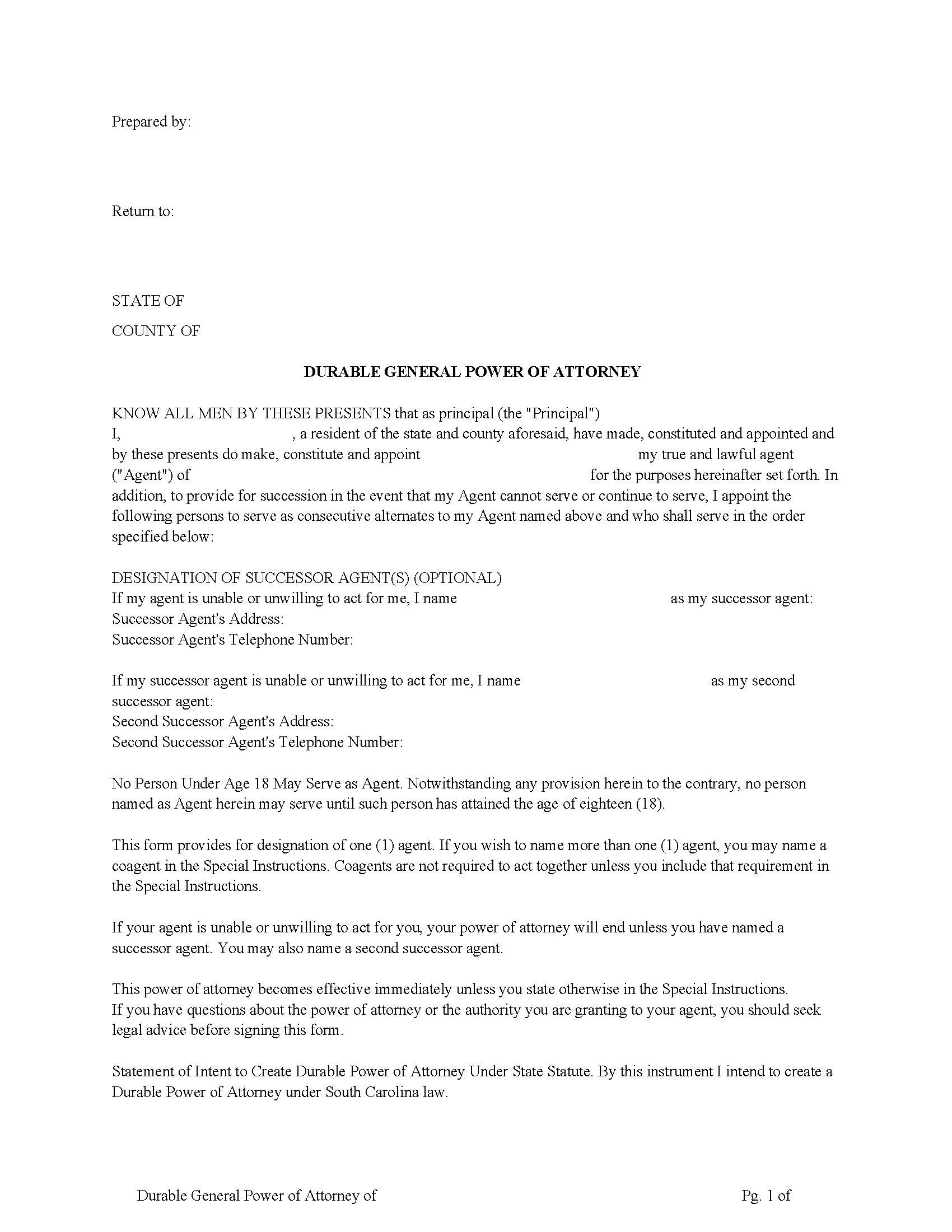
This is a comprehensive 14 page South Carolina General Power of Attorney Form formatted for recording at a County level.
Power Not Affected by Principal's Incapacity.
This Power of Attorney is durable as provided by S.C. Code Ann. 62-8-104 which means that it is not terminated by the principal's incapacity. "Incapacity" means inability of an individual to manage property or business affairs because the individual: (A) has an impairment in the ability to receive and evaluate information or make or communicate decisions even with the use of technological assistance; or (B) is: (i) missing; (ii) detained, including incarcerated in a penal system; or (iii) outside the United States and unable to return.
I specifically direct my Agent to defer to and abide by any Health Care Power of Attorney, Durable Power of Attorney for Health Care, "Living Will" or Declaration of a Desire for A Natural Death [hereinafter "Declaration"] executed by me. My Agent shall in no way interfere with, impede, or act contrary to my wishes, intention, and directives in such instrument or instruments. In the event any decisions or matter within the scope of the Agent's authority granted herein should dir... More Information about the South Carolina General Durable Power of Attorney
Certificate of Trust
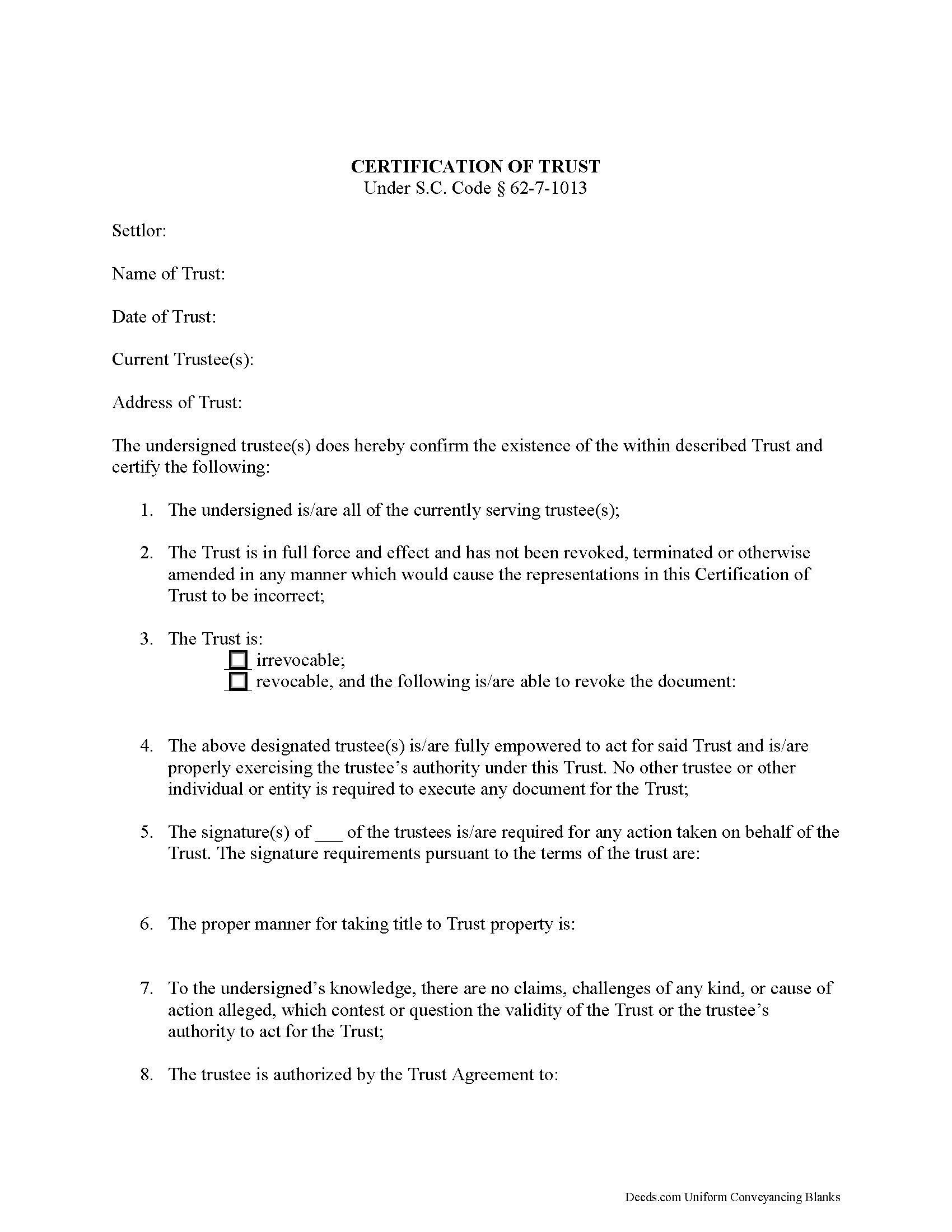
South Carolina Certification of Trust
The certification of trust is codified at S.C. Code 62-7-1013 as part of the South Carolina Trust Code. A certificate of trust presents a summary of the trust to which it pertains, and verifies a trust's existence and the trustee's authority to act on behalf of the trust. A trustee may present the document in lieu of the trust instrument any person who is not a trust beneficiary. This allows the trustee to maintain the privacy of the settlor's estate plans by presenting only necessary information about the trust to parties outside the trust arrangement.
The format of the South Carolina certificate presents the most basic information about the trust first, including the name of the trust and date of execution of the trust instrument, and the name of each settlor and the acting trustee's name and address.
The certificate then presents certified statements, made by the trustees, that all currently serving trustees have executed and acknowledged the instrument, and that the trust "has not been revoked, modified, or amended in any manner that would cause the representations contained in the certification of trust to be incorrect" ( 62-4-... More Information about the South Carolina Certificate of Trust
Lis Pendens
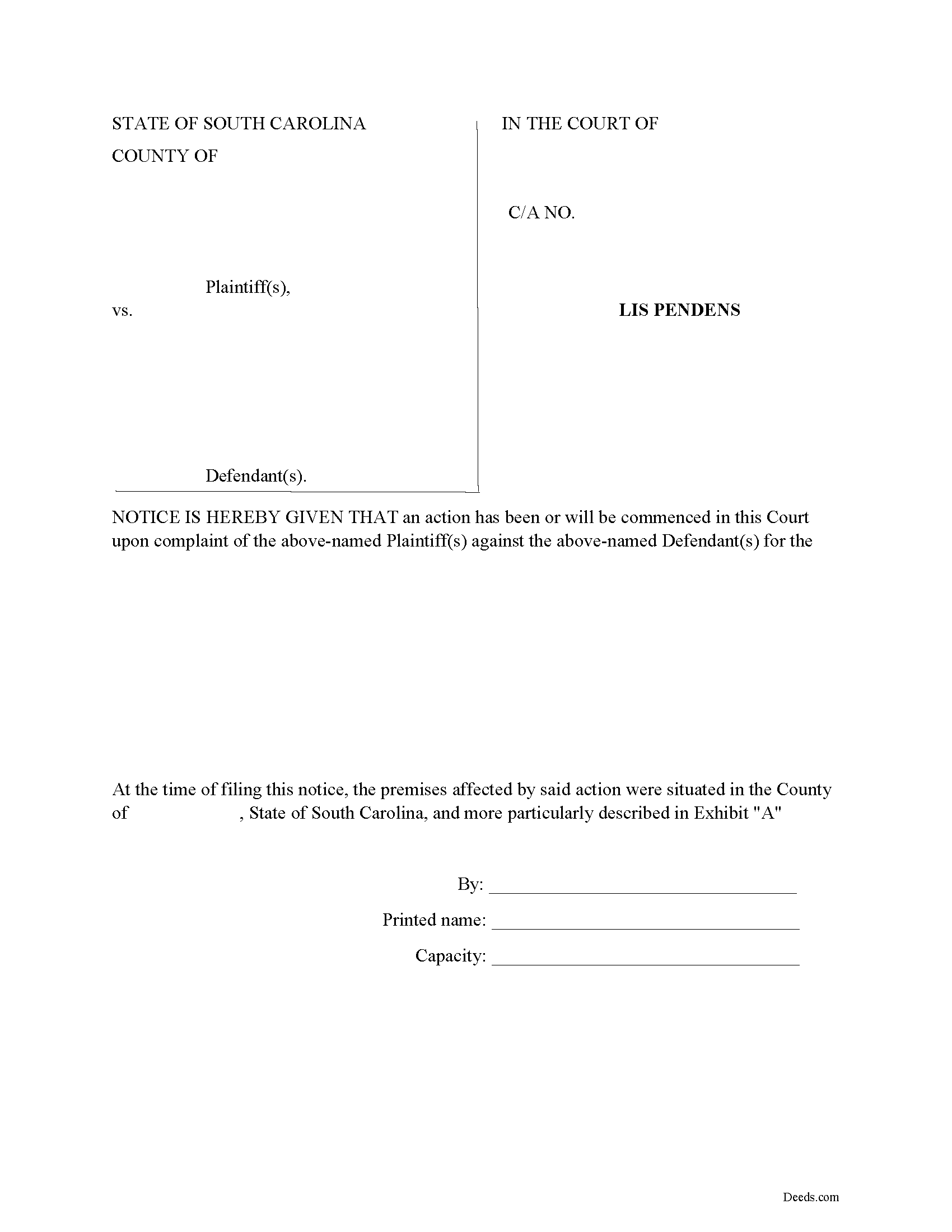
In South Carolina a Lis Pendens (affecting title to real property) can be recorded by the plaintiff, with the County Recorder's Office up to 20 days before the actual Court Case is filed (or at any time afterwards). A Defendant may also file a Lis Pendens in certain circumstances. This form is formatted to be filed by the Plaintiff [party initiating the claim]. (SECTION 15-11-10)
(South Carolina LP Package includes form, guidelines, and completed example)
... More Information about the South Carolina Lis Pendens
Lis Pendens Release
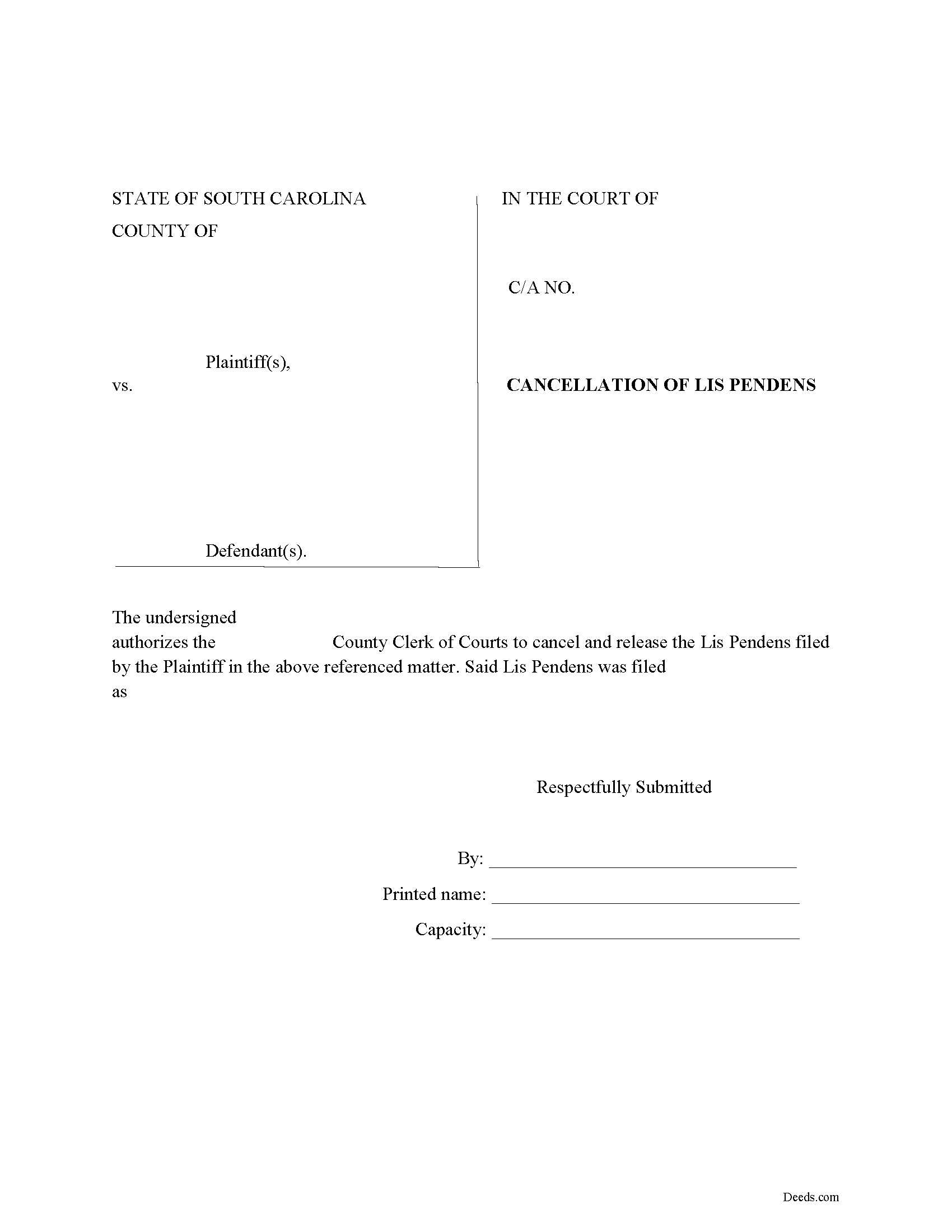
Cancellation Notice of Lis Pendens
Under certain conditions, the Court may order that a Lis Pendens be cancelled (by the clerk of any county in whose office the notice was filed or recorded.) A Lis Pendens can also be cancelled by the person who filed it, at (any time after the action has been settled, discontinued, abated, or dismissed by a court of law by the submission of a written notice of cancellation to the clerk of court of each county in which a notice was filed or recorded.) SECTION 15-11-40.
(South Carolina LP Release Package includes form, guidelines, and completed example)
... More Information about the South Carolina Lis Pendens Release
Disclaimer of Interest
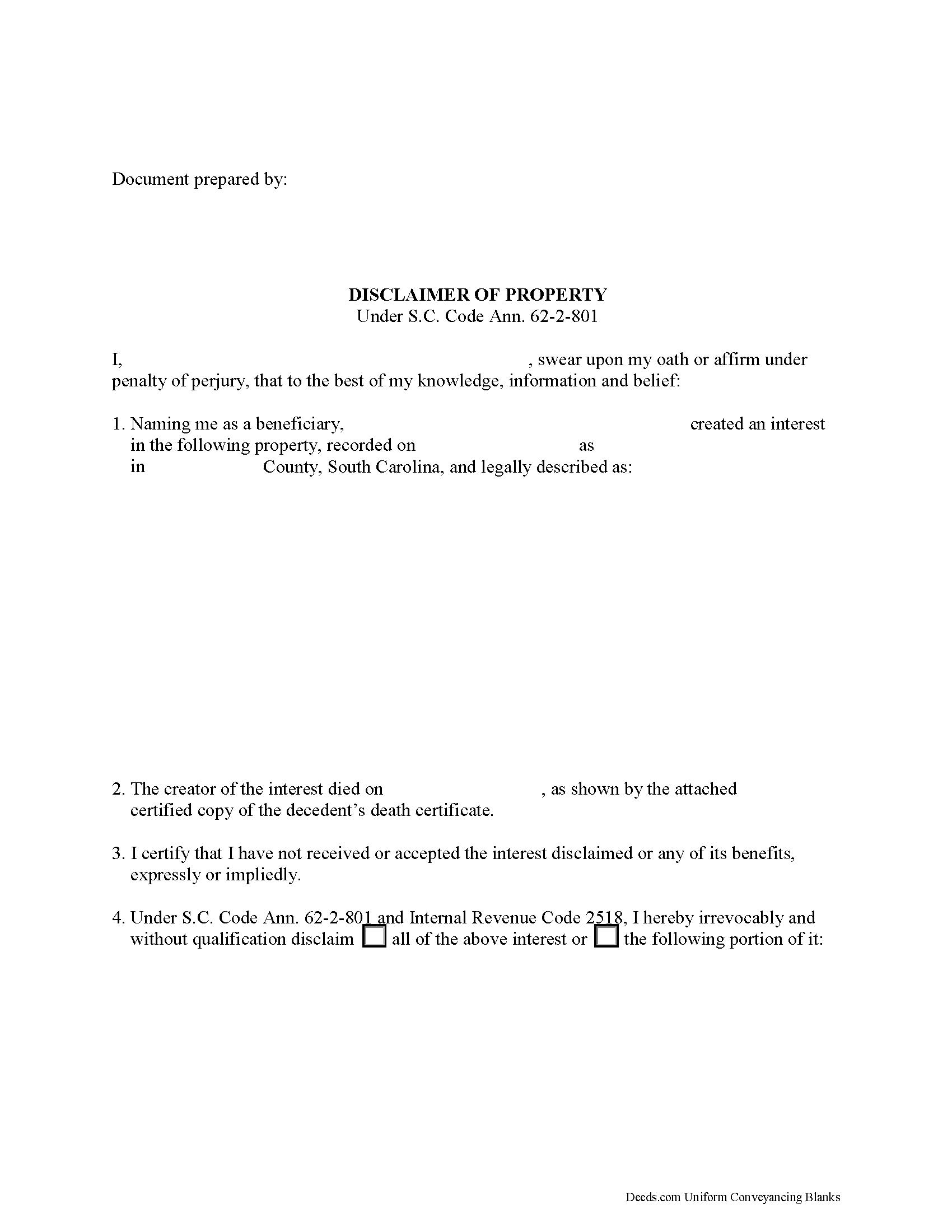
Under the South Carolina statutes, the beneficiary of an interest in property may renounce the gift, either in part or in full (S.C. Code Ann. 62-2-801). Note that the option to disclaim is only available to beneficiaries who have not acted in any way to indicate acceptance or ownership of the interest (S.C. Code Ann. 62-2-801 (c) (5))
The disclaimer must be in writing and include a description of the interest, a declaration of intent to disclaim all or a defined portion of the interest, and be signed by the disclaimant (S.C. Code Ann. 62-2-801 (c) (3)).
Deliver the disclaimer within nine months of the transfer (e.g., the death of the creator of the interest) to the transferor, his or her fiduciary, the person holding title or possession of the property, or to the court that would have jurisdiction (S.C. Code Ann. 62-2-801 (c) (3) (iv)). In the case of real property, record a copy of the disclaimer in the office of the clerk of courts or the registrar of the county in which the real estate is located.
A disclaimer is irrevocable and binding for the disclaiming party and his or her creditors, so be sure to consult an attorney when in doubt about the drawbacks and benefi... More Information about the South Carolina Disclaimer of Interest